Key takeaways:
- Creative feedback is essential for artistic growth, challenging artists to refine their work and discover their unique voices.
- Constructive criticism, emotional response feedback, and peer insights each play a vital role in enhancing poetry and fostering community among poets.
- Effective feedback should be clear, empathetic, and timely to create a supportive environment for artists to evolve.
- Embracing feedback as an opportunity and practicing gratitude can lead to breakthroughs and deeper emotional connections in writing.
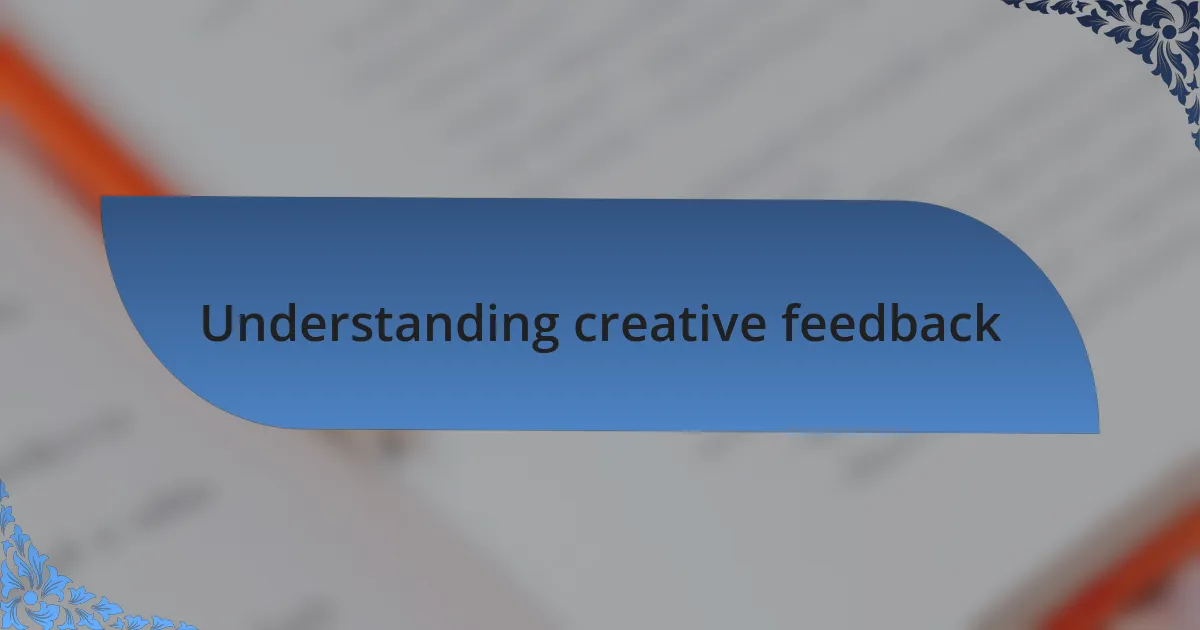
Understanding creative feedback
Creative feedback is like a compass for artists; it guides us toward refinement and growth. I remember receiving a piece of feedback early in my poetic journey that completely shifted my perspective. It wasn’t just about what I could change; it was about understanding how my words resonated (or didn’t) with others. Have you ever considered how feedback shapes not only your work but also your evolution as a creator?
At times, feedback can feel like a double-edged sword. While it offers invaluable insights, it can also trigger vulnerability. I’ve had moments when criticism stung, making me question my entire approach. Yet, reflecting on this, I realize that even the toughest critiques can spark creativity. They challenge us to dig deeper and find our unique voice amidst the noise.
Understanding the nuances of creative feedback is crucial. It’s essential to discern between constructive criticism that uplifts and mere opinion that deflates. I once shared a poem with a friend who gently pointed out its weaknesses, yet their encouragement to explore new themes ignited a surge of inspiration in me. Have you experienced a similar transformation? That’s the magic of genuine feedback—it’s not just about what we hear; it’s about what we choose to do with it.
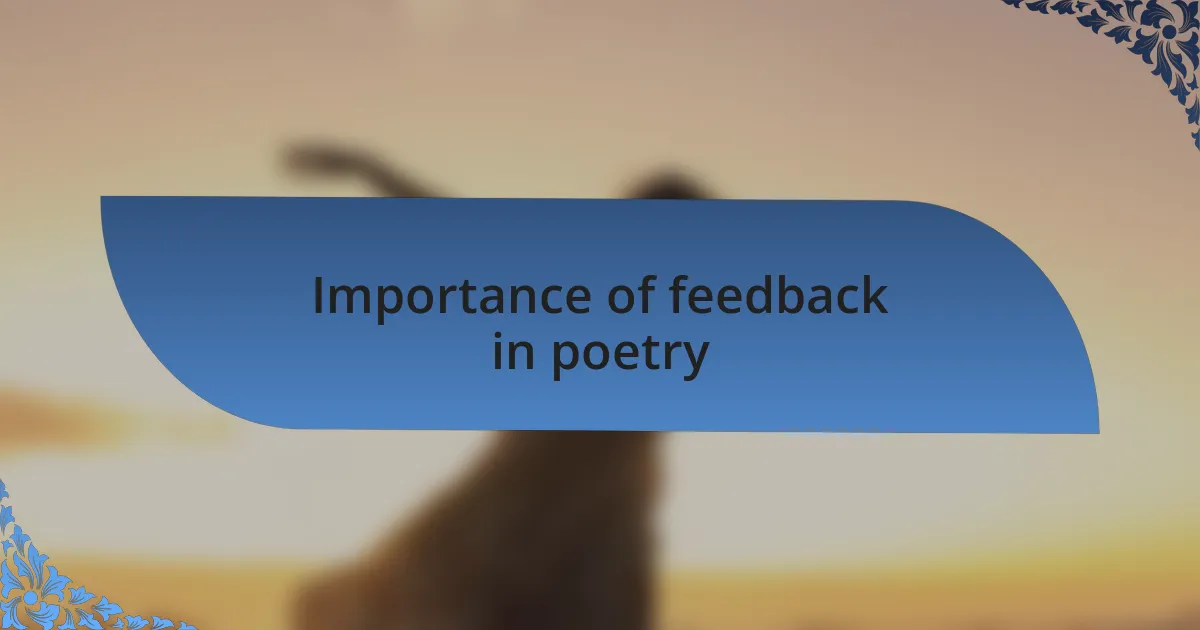
Importance of feedback in poetry
Feedback in poetry serves as a vital tool for growth, often unveiling layers of meaning that we might overlook in our own work. I once shared a new piece with a local writing group, and their perspectives opened my eyes to aspects I hadn’t even considered. Have you ever had someone highlight an emotional thread in your poem that you thought was subtle? That moment of realization can be incredibly enlightening.
Moreover, feedback fosters community among poets, creating an environment where we can exchange ideas and cultivate support. I distinctly recall a time when fellow poets offered insights on a series I was developing, encouraging me to weave in personal experiences. Their suggestions transformed my writing, allowing me to connect more deeply with my audience. It makes me wonder—how could sharing your work with a trusted circle elevate your craft?
Ultimately, constructive feedback helps us push boundaries and explore new creative avenues. I remember being challenged to write a poem from an entirely different perspective; the result was a piece that surprised even me. Have you ever taken a leap like that? Engaging with feedback not only refines our current work but also encourages us to take those bold risks that can lead to profound artistic breakthroughs.
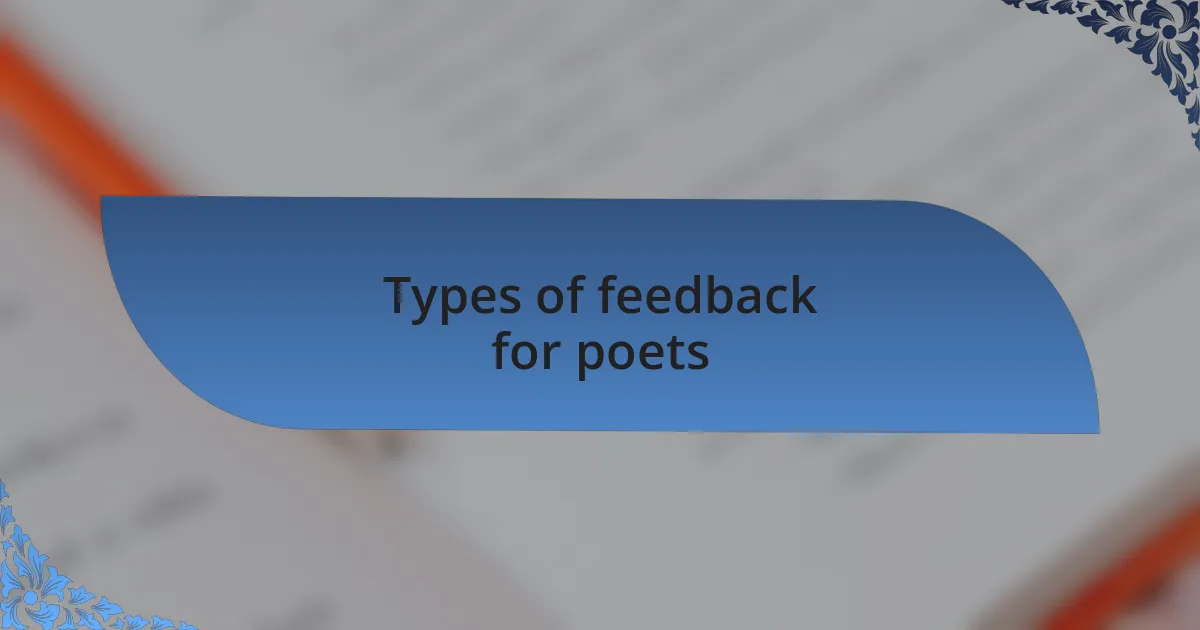
Types of feedback for poets
One type of feedback that resonates with many poets is constructive criticism. I remember sharing a draft with a mentor who gently pointed out areas where my imagery fell flat. At first, it stung a little, but reflecting on her insights led me to revisit those lines and ultimately strengthen them. Have you experienced the moment when someone’s honest feedback catalyzes a significant improvement in your work?
Another valuable form of feedback is emotional response feedback, where readers share how a poem makes them feel. I once read a piece to a group, and one member described how it reminded them of a personal loss. Their words stuck with me, showing the profound impact a poem can have, even if the emotions conveyed differ from my own intentions. Isn’t it enlightening to discover how others interpret our emotions?
Finally, peer feedback can be incredibly enriching, especially in a group setting. During a workshop, I found that hearing diverse perspectives on my work created a dialogue that I hadn’t anticipated. One poet raised an idea about shifting the poem’s tone that completely changed my approach. Have you thought about how sharing your work can spark new ideas through the insights of your peers?
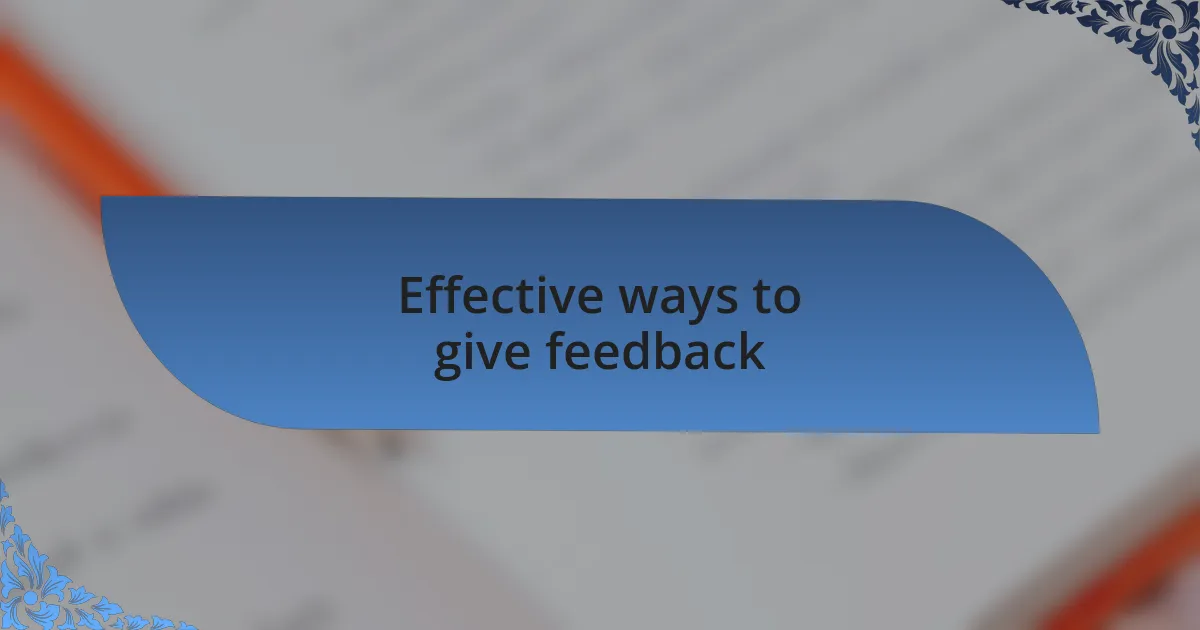
Effective ways to give feedback
When offering feedback, clarity is essential. I recall a session where a fellow poet critiqued my work, but their comments were muddled with vague phrases. It left me confused and unsure of how to improve. This experience taught me that articulating specific strengths and weaknesses can make all the difference. Isn’t it empowering to receive guidance that you can clearly act upon?
Additionally, delivering feedback with empathy can create a safe space for artists to grow. I once participated in a feedback circle, and one participant took a moment to understand our emotions before diving into suggestions. The warmth in their approach made it easier to accept their critiques, fostering an atmosphere where everyone felt valued. Have you noticed how kindness can influence the receptiveness of feedback?
Lastly, timing can greatly affect how feedback is received. After my first public reading, I was overwhelmed and not quite ready to hear critiques. I learned that providing space for reflection before diving into feedback can enhance its impact. Have you considered how giving someone a moment to absorb their performance can lead to more fruitful discussions later on?
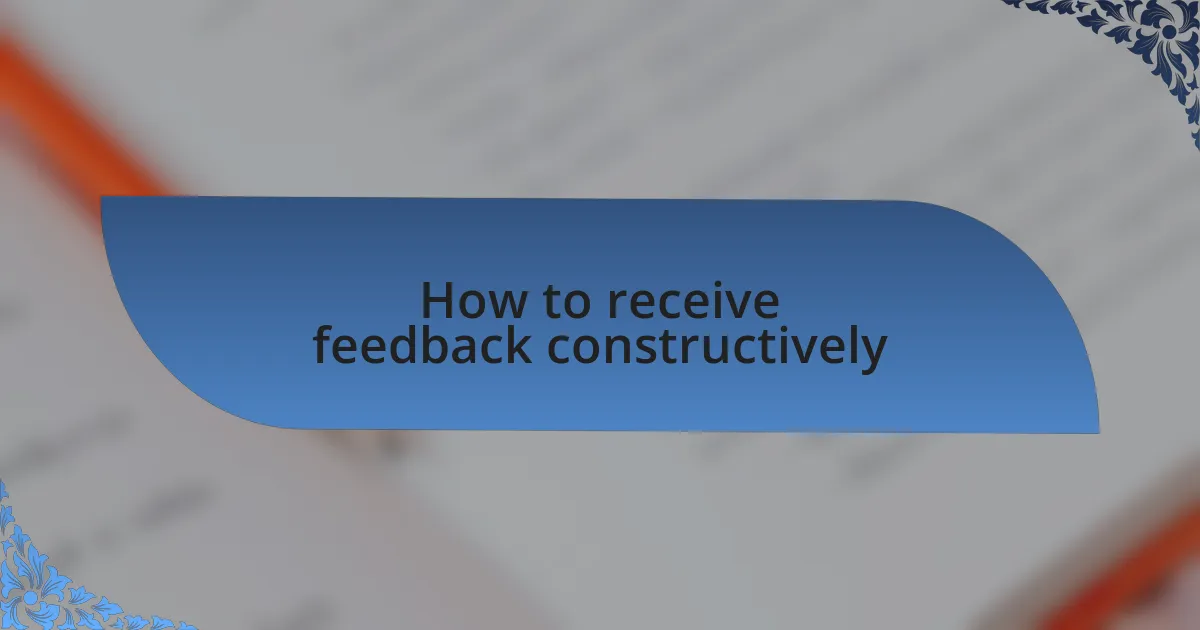
How to receive feedback constructively
Receiving feedback constructively is an art in itself. I remember a time when I received a critique that initially stung; the poet highlighted my use of imagery as lacking depth. Instead of reacting defensively, I took a step back and asked myself how I could explore the images more vividly. Have you ever considered how the way we process feedback shapes our growth as artists?
It’s vital to embrace feedback as an opportunity, not a judgment. One day, during a workshop, a fellow poet suggested I try different formats for my verses. While it felt like a challenge at first, I realized that experimentation could lead to exciting new pathways in my writing. The key is to shift our mindset from seeing feedback as criticism to viewing it as a chance to evolve. Isn’t it fascinating how shifting our perspective can lead to breakthroughs in creativity?
Moreover, practicing gratitude in the feedback process can change the game. I once had a mentor who would always thank us for our insights, regardless of the content. This simple act made me more open to their perspectives, turning every session into a collaborative experience. Have you experienced how gratitude can redefine your relationship with feedback?
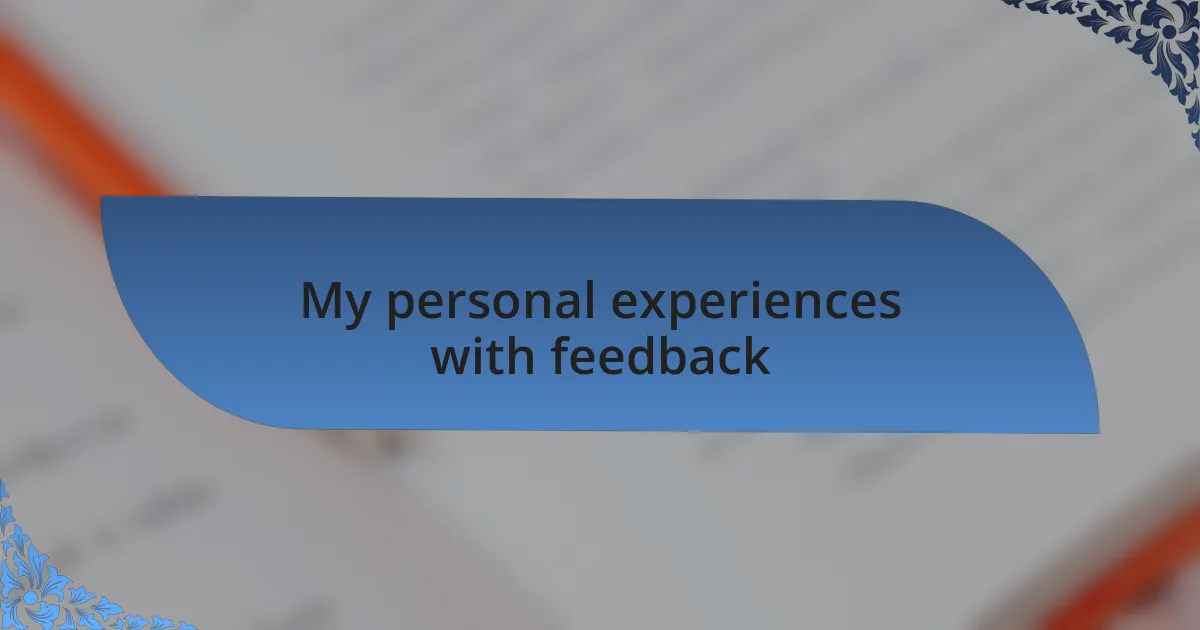
My personal experiences with feedback
When I think back on my experiences with feedback, one moment stands out. A fellow poet once told me that my rhythm felt erratic, which stirred a mix of frustration and vulnerability within me. Yet, as I sat with that feedback, I realized it was an invitation to refine my craft. Have you ever felt that initial jolt of defensiveness transform into determination?
Another occasion really opened my eyes to the power of diverse perspectives. I was part of a poetry circle where members critiqued each other’s work. One comment that resonated was about the emotional resonance of my pieces. A participant noted that while my imagery was vivid, I often held back the raw emotion I felt. This spurred me to delve deeper into my own feelings when writing. How can unearthing our deeper emotions enhance the authenticity of our poetry?
The most constructive feedback I’ve received often came unexpectedly. I remember submitting a poem that I thought was polished, only to be met with suggestions for several revisions. I initially felt disheartened, but as I revisited my work, I discovered layers and connections that I had overlooked. Have you ever had the experience where a critique ostensibly shatters your confidence but ultimately leads you to a greater understanding of your artistry?
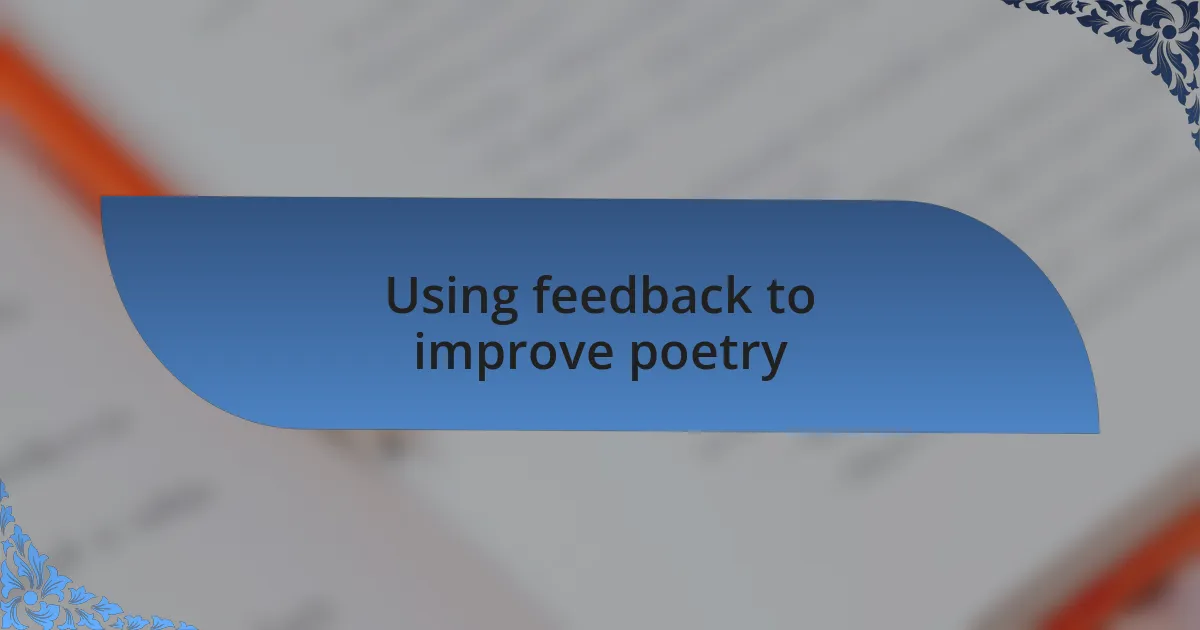
Using feedback to improve poetry
Receiving constructive feedback can often feel like standing at the edge of a diving board, teetering between fear and excitement. I once shared a draft with a mentor who pointed out the lack of clarity in my themes. Initially, I felt a sense of disappointment, but as I revisited the piece, I understood that clarification was essential to convey my message. How often do we miss the essential threads in our writing simply because we’re too close to the work?
In another instance, I shared a poem that I thought was beautifully crafted, complete with intricate metaphors and fanciful language. A friend, however, noted that the poem lacked a strong emotional core. This feedback nagged at me in the days that followed, prompting me to explore deeper emotions within myself. How can our willingness to be vulnerable not only enhance our poetry but also create connections with readers?
I learned that feedback is not just criticism; it’s a tool for revelation. After attending a workshop where we dissected each other’s poems, my eyes were opened to the myriad interpretations of my work. One participant shared how my poem triggered a memory for them, making it clear that poetry transcends our own intentions. Isn’t it fascinating how our words can resonate differently in someone else’s heart?